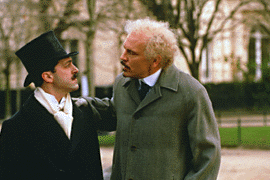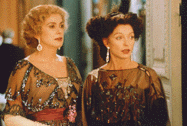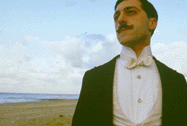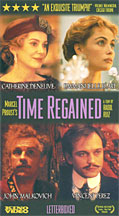FILM NOTES
FILM NOTES INDEX
NYS WRITERS INSTITUTE
HOME PAGE

(French/Italian, 1999, 158 minutes, color, 35mm, in French w/English subtitltes)
Directed by Raul Ruiz
Cast:
Catherine Deneuve . . . . . . . . . . Odette
Emmanuelle Beart . . . . . . . . . . Gilberte
Vincent Preez . . . . . . . . . . Morel
John Malkovich . . . . . . . . . . Charles
Marcello Mazzarella . . . . . . . . . . Proust
"Time Regained," adapted by Chilean director Raul Ruiz from the final volume of Marcel Proust’s epic "Remembrance of Things Past," is about the texture of memory.
Set in the early 20th century, in the salon society of the Paris elite, the film begins with the aging narrator (a not-so-thinly veiled Marcel Proust, played by lookalike actor Marcello Mazzarella but voiced by Patrice Chereau) dictating his final novel from a sickbed: "Then one day, everything changes."
That phrase describes the film nicely: nothing is fixed, everything is in flux. In this opening scene, the camera glides through the bric-a-brac of his bedroom as the room expands and shrinks wildly from shot to shot. Far from mere acrobatics, it sets the stage for an exploration of the fabric of memory.
The narrator’s mind floats back to his days with a small circle of acquaintances: gentleman gadabout Count Saint Loup (Pascal Greggory) and his neglected young wife Gilberte (Emmanuelle Béart), her luxury-loving mother Odette
(Catherine Deneuve), the insolently decadent Baron de Charlus (John Malkovich), pianist/journalist Morel (Vincent Perez), and social busybody Madame Verdurin (Marie-France Pisier).
 Bookended by two high-society salons, we follow the characters through World War I in a catalog of small talk, petty feuds, vicious gossip, meaningless affairs and endless parties, which Ruiz manages to make both ridiculous and fascinating. Mazzarella’s narrator is both observer and participant, but his presence is dominated by his calm eyes and restrained, wry smile as he mingles and records.
Bookended by two high-society salons, we follow the characters through World War I in a catalog of small talk, petty feuds, vicious gossip, meaningless affairs and endless parties, which Ruiz manages to make both ridiculous and fascinating. Mazzarella’s narrator is both observer and participant, but his presence is dominated by his calm eyes and restrained, wry smile as he mingles and records.
It’s a rich mix of characters and a gorgeous evocation of the period, with delicate images and bravura camerawork (by Ricardo Arnovich), but what makes the film come alive is the way Ruiz gracefully weaves through flashbacks triggered by sights, sounds and thoughts, effortlessly ricocheting from remembrance to remembrance.
Densely layered, demanding and beautiful, Ruiz has found the perfect venue for his passions and created the most cinematically breathtaking film of the new millennium.
— Sean Axmaker, Seattle Post-Intelligencer, September 15, 2000
"Time Regained," the tastefully brash, subtly eccentric, and altogether triumphant Raúl Ruiz adaptation of the labyrinthian volume that brings Marcel Proust’s "Remembrance of Things Past" to its magnificent conclusion, is a golden reverie on a passing age—namely ours.
Writing in the light of the Lumière brothers’ cinematographe, Proust sought to have his readers visualize temporality; filming at the dawn of the digital era, Ruiz allows the flow of static images through the movie projector to merge with the stream of time, while pondering the paradox of memories fixed in emulsion. "Time Regained’s" characters are introduced as the dying Proust shuffles through his collection of photos. "Then one day," he muses, "everything changes."
 The movie searches for that day. A humorously shocking scene in a male bordello notwithstanding, "Time Regained"—which had its local premiere at the last New York Film Festival—is primarily a series of spectacular social gatherings through which men stroll beneath outsize hats and women glide in feathered finery. The action is set mainly during the always off-camera First World War, and everyone is living le mode rétro. The funerals are oddly festive; the other receptions have a comic haunted-house feel. At one, the guests obligingly turn to stone to serve as screens for the shadow play of the child Marcel’s magic lantern. Elsewhere, figures are frozen and illuminated by the camera while Ruiz integrates vintage films throughout—reveling in the presence of this new entertainment machine.
The movie searches for that day. A humorously shocking scene in a male bordello notwithstanding, "Time Regained"—which had its local premiere at the last New York Film Festival—is primarily a series of spectacular social gatherings through which men stroll beneath outsize hats and women glide in feathered finery. The action is set mainly during the always off-camera First World War, and everyone is living le mode rétro. The funerals are oddly festive; the other receptions have a comic haunted-house feel. At one, the guests obligingly turn to stone to serve as screens for the shadow play of the child Marcel’s magic lantern. Elsewhere, figures are frozen and illuminated by the camera while Ruiz integrates vintage films throughout—reveling in the presence of this new entertainment machine.
 Proust is a writer whose work defeated such would-be adapters as Joseph Losey, Bernardo Bertolucci, and Luchino Visconti. Volker Schlöndorff eliminated Marcel’s subjective consciousness in his tepid adaptation of "Swann’s Way"; Ruiz makes this observer his central character. The bedridden writer is visited by ghosts in his dreams and watched by his childhood self in his memories. A pursed and pomaded near-double for Proust, Italian actor Marcello Mazzarella makes a dapper little outsider in an ostentatiously glittering ensemble. Even the star turns—which include such once and future divas as Catherine Deneuve, Emmanuelle Béart, Marie-France Pisier, and Edith Scob—are fully inhabited performances. As the perverse Baron Charlus, John Malkovich is the personification of wit, and particularly after his character suffers a stroke, the actor’s French only improves his mannerist delivery.
Proust is a writer whose work defeated such would-be adapters as Joseph Losey, Bernardo Bertolucci, and Luchino Visconti. Volker Schlöndorff eliminated Marcel’s subjective consciousness in his tepid adaptation of "Swann’s Way"; Ruiz makes this observer his central character. The bedridden writer is visited by ghosts in his dreams and watched by his childhood self in his memories. A pursed and pomaded near-double for Proust, Italian actor Marcello Mazzarella makes a dapper little outsider in an ostentatiously glittering ensemble. Even the star turns—which include such once and future divas as Catherine Deneuve, Emmanuelle Béart, Marie-France Pisier, and Edith Scob—are fully inhabited performances. As the perverse Baron Charlus, John Malkovich is the personification of wit, and particularly after his character suffers a stroke, the actor’s French only improves his mannerist delivery.
Given the audacity of adapting the last novel in a multivolume series, "Time Regained" presents a few difficulties for those unfamiliar with Proust’s novel—although it also serves as a superb trailer. (When the movie opened in the U.K. early this year, it elevated Proust to best-sellerdom.) As David Cronenberg did with "Naked Lunch," Ruiz has made a film about the novel—it is a meditation on, rather than a copy of, the original. Ruiz imagines Proust as though Proust were imagining a movie. (Thanks to the model Ruiz provides, Hou Hsiao-hsien’s time-twisting masterpiece, "The Puppetmaster," becomes retrospectively "Proustian.")
Although "Time Regained" is not as aggressively cheap or provocatively lurid as standard Ruiz, the Chilean-born filmmaker has not abandoned his "underdeveloped" disrespect for European culture. At times, "Time Regained" suggests an irreverently lively, historical, and colorized version of "Last Year at Marienbad." Playfully jumbling time and space, freezing the moment and choreographing long, fluid takes, doubling back to jump ahead, it’s full of surprises. The most amazing thing is that this may be the most relaxed movie Ruiz has ever made. Would that it were the most commercially successful. The daring of the conception is matched only by the brilliance of the execution. (All hail Kino in releasing what is so far the most exhilarating movie-movie of the year.)
 With misplaced nostalgia, contemporary filmmakers continue to revisit those literary classics written before there were movies. Ruiz is more creatively anachronistic. This is a 20th-century movie about a 20th-century novel. The filmmaker attempts to approximate not Proust’s prose but rather the writer’s modernist, multiple-perspective simultaneity. People are simultaneously old and young. Marcel wanders through the crypt after his child self. As the camera moves, statues parade through a shifting foreground. "Time Regained" is a testament to Marcel’s understanding that "the true paradises are those we lost"—which is to say that the pleasure it provides is the involuntary memory of cinema itself.
With misplaced nostalgia, contemporary filmmakers continue to revisit those literary classics written before there were movies. Ruiz is more creatively anachronistic. This is a 20th-century movie about a 20th-century novel. The filmmaker attempts to approximate not Proust’s prose but rather the writer’s modernist, multiple-perspective simultaneity. People are simultaneously old and young. Marcel wanders through the crypt after his child self. As the camera moves, statues parade through a shifting foreground. "Time Regained" is a testament to Marcel’s understanding that "the true paradises are those we lost"—which is to say that the pleasure it provides is the involuntary memory of cinema itself.
— J. Hoberman, The Village Voice, June 14, 2000
When Marcel Proust wrote his masterpiece of patience, In Search of Lost Time/The Remembrance of Time Past, he urged reflection on a world that seemed suddenly to have no capacity for it. A new century of automobiles and skyscrapers and mechanized warfare shattered memory into a thousand pieces, and made what had gone before something shamefully primitive. The past was no longer prologue. Now, it was merely past, something to be shaken off and discarded. As it was in the mind of the culture, so perhaps, worried Proust, would it become in the minds of men and women; memory itself would be forgotten, and with the forgetting would go the curative, reconciling power of memory, a power needed more then ever in the face of the noisy dislocations of modernism.
Adaptations of Proust have been tried before, and by the luminaries of world cinema. Bernardo Bertolucci, Joseph Losey, Volker Schlondorff, and Luchino Visconti have each struggled with the Proustian ideal of looking back in order to look forward. Each of them foundered on the sheer rock of Proust's decidedly spiritual understanding of time; the massive, seven-novel epic Proust had written was itself an investment in that scarcest of all commodities. Proust had confined himself to an infamous cork-lined room to write his monument to time, forcing himself to gaze as deeply into the past as his mysterious narrator experiences. The cinema, on the other hand, seemed designed by the most conspiratorial modernist to assail time, to chop it up, to so radically condense time as to make it almost meaningless, at least in the reassuring, cyclical terms humankind had known it for centuries. Time Regained, the last volume of his saga of remembering, was Proust's attempt to win back for memory a central place in the modern consciousness. In films such as CITIZEN KANE, LAST YEAR AT MARIENBAD, and PULP FICTION, the movies have spoken articulately against this conservation of memory.
It was Raul Ruiz' inspiration to include Proust himself in the account of time's redemption. By watching Proust watch his recollections, seeing the past fuse into the present before us, it somewhat as if we are taking Proust's verbatim testimony to the validity of thinking back. Ruiz clearly feels that adapting Proust has heretofore meant seeking elusive cinematic parallels to Proust's languid and careful prose, but in the process, the very soul of cinema, its time- destroying narration, worked against this well-meaning but flawed analogy. Ruiz respects less the time and setting of Proust's life than the fact of Proust's subjectivity. By implication, he honors the collection of memories that make up each of us.
As the dean of American film critics, The Village Voice's J. Hoberman, noted that Proust had wanted nothing less than to have his readers see time. Raul Ruiz uses spectacular camerawork, multiple points of view, and vivid color to insert us into Proust's 1922, from which it sends us hurtling back into his dreamy, idyllic childhood, and then switches gears, tossing us into the psychological maelstrom of World War One, and the brittle gentility of French boulevard society. Finally, in Raul Ruiz' TIME REGAINED, time is liberated from the exquisite slavery of the cinema, and restored to the limitless range of the human mind.
— Kevin Hagopian, Penn State University
For additional information, contact the Writers Institute at 518-442-5620 or online at https://www.albany.edu/writers-inst.
 Time Regained
Time Regained